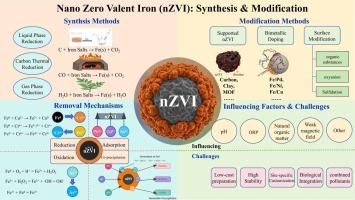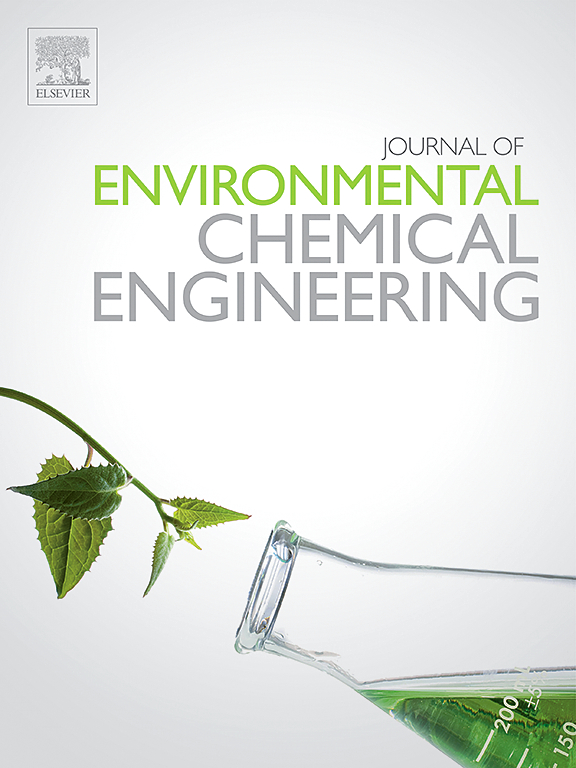纳米零价铁(nZVI)修复重金属污染环境的研究进展:改性方法、机理、影响因素及应用挑战
IF 7.2
2区 工程技术
Q1 ENGINEERING, CHEMICAL
引用次数: 0
摘要
重金属污染水体和土壤的修复已成为一项重大挑战。纳米零价铁(nZVI)具有优异的重金属脱除性能,在环境修复中显示出巨大的潜力。本文综述了nZVI、改性nZVI及相关复合材料在土壤和水中重金属修复中的研究进展。本文首先综述了nZVI的不同制备途径以及近年来的几种改性方法,如表面涂覆、硫化、氧阴离子改性等。同时,对几种改性nZVI对重金属的去除能力进行了比较。其次,概述了重金属阳离子或阴离子与nZVI的一般相互作用机制,包括吸附、还原、氧化和共沉淀。第三,系统讨论了环境中pH、氧化还原电位(ORP)、天然有机质(NOM)等影响重金属去除的因素。最后,强调了nZVI在污染场地实际利用所面临的挑战,并提出了进一步发展的建议。本文章由计算机程序翻译,如有差异,请以英文原文为准。

Recent advances of nano zero-valent iron (nZVI) on the remediation of heavy metals polluted environment: Modified methods, mechanisms, influencing factors and application challenges
Remediation of heavy metal-contaminated water and soil has become a significant challenge. Nano zero-valent iron (nZVI) exhibits great potential in environmental remediation due to its excellent removal properties for heavy metals. This review provides a comprehensive overview of advances in nZVI, modified nZVI, and related composites for heavy metal remediation in soil and water. First, this paper summarizes different preparation routes for nZVI and several recent modification methods, such as surface coating, sulfidation, and oxyanion modification. Meanwhile, removal capacities of heavy metals by some modified nZVI are listed and compared. Second, the general interaction mechanisms of heavy metal cations or anions and nZVI are recapitulated as adsorption, reduction, oxidation, and co-precipitation. Third, the factors influencing heavy-metal removal in the environment, including pH, oxidation-reduction potential (ORP), and natural organic matter (NOM) are systematically discussed. Finally, perspectives on the challenges of nZVI practical utilization at contaminated sites are highlighted and proposed for further development.
求助全文
通过发布文献求助,成功后即可免费获取论文全文。
去求助
来源期刊

Journal of Environmental Chemical Engineering
Environmental Science-Pollution
CiteScore
11.40
自引率
6.50%
发文量
2017
审稿时长
27 days
期刊介绍:
The Journal of Environmental Chemical Engineering (JECE) serves as a platform for the dissemination of original and innovative research focusing on the advancement of environmentally-friendly, sustainable technologies. JECE emphasizes the transition towards a carbon-neutral circular economy and a self-sufficient bio-based economy. Topics covered include soil, water, wastewater, and air decontamination; pollution monitoring, prevention, and control; advanced analytics, sensors, impact and risk assessment methodologies in environmental chemical engineering; resource recovery (water, nutrients, materials, energy); industrial ecology; valorization of waste streams; waste management (including e-waste); climate-water-energy-food nexus; novel materials for environmental, chemical, and energy applications; sustainability and environmental safety; water digitalization, water data science, and machine learning; process integration and intensification; recent developments in green chemistry for synthesis, catalysis, and energy; and original research on contaminants of emerging concern, persistent chemicals, and priority substances, including microplastics, nanoplastics, nanomaterials, micropollutants, antimicrobial resistance genes, and emerging pathogens (viruses, bacteria, parasites) of environmental significance.
 求助内容:
求助内容: 应助结果提醒方式:
应助结果提醒方式:


